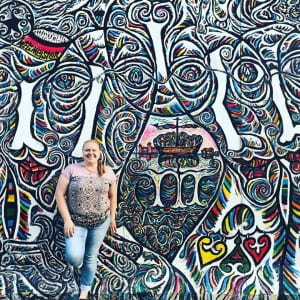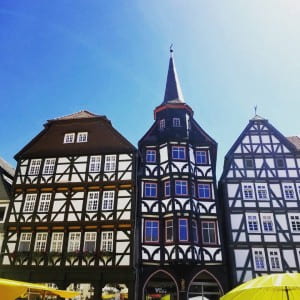Majors: French, History
Minors: German, Education
Year in School: Super Senior
Programs: Spring Semester in Pau, France (with USAC) and International Summer University in Kassel, Germany (through UWGB)
Why did you choose to study abroad?
I have always been a bit of a travel bug and culture nut, so studying abroad was always on my list of things to do in college. I really wanted to immerse myself in a new culture and get a taste of what it was like to live like the people in those countries do. I had already been to Europe a few times before, once for a choir trip and the second for a semester study abroad in Scotland, and I was dying to get to see more of Europe and get to know France and Germany better. I also studied abroad to improve my foreign language skills.
Why did you choose to go where you did?
 My reasons for choosing France and Germany were because I study both French and German, so I naturally wanted to spend time in those countries immersing myself in the languages. I’ve studied French for almost eight years, and love the language and culture, so I was dying to actually spend time in France and experience everything the country had to offer for myself. I chose Germany because I also love the language and culture, but also because Germany is also a very important country for me. My family comes from there (my grandmother was German and my mom was born there), and I also have several close friends from Germany. The summer program in Germany was a great opportunity for me to get to know this country a bit better and also get to see friends and family. I also designed my seven months in Europe (four months in France, two months of travel, one month in Germany) so that I also had to opportunity to explore the rest of Europe and visit friends.
My reasons for choosing France and Germany were because I study both French and German, so I naturally wanted to spend time in those countries immersing myself in the languages. I’ve studied French for almost eight years, and love the language and culture, so I was dying to actually spend time in France and experience everything the country had to offer for myself. I chose Germany because I also love the language and culture, but also because Germany is also a very important country for me. My family comes from there (my grandmother was German and my mom was born there), and I also have several close friends from Germany. The summer program in Germany was a great opportunity for me to get to know this country a bit better and also get to see friends and family. I also designed my seven months in Europe (four months in France, two months of travel, one month in Germany) so that I also had to opportunity to explore the rest of Europe and visit friends.
What’s the best part about studying abroad? Favorite experience?
 It is honestly so difficult to pick what is the best part about studying abroad. My seven month stay in Europe was such an amazing and life changing experience, and I definitely did a lot in those seven months. I guess I would say that the best thing about being in Europe in particular is the opportunity to travel to many different countries since many of the countries are relatively close. In total, I was able to travel to eleven different countries with relative ease and for relatively cheap. It was amazing to see how different neighboring countries in Europe can be from each other.
It is honestly so difficult to pick what is the best part about studying abroad. My seven month stay in Europe was such an amazing and life changing experience, and I definitely did a lot in those seven months. I guess I would say that the best thing about being in Europe in particular is the opportunity to travel to many different countries since many of the countries are relatively close. In total, I was able to travel to eleven different countries with relative ease and for relatively cheap. It was amazing to see how different neighboring countries in Europe can be from each other.
However, despite all the traveling I did, my favorite experience was actually just the time I got to spend with my international friends. I hadn’t seen some of these friends in one or two years, so it was such an amazing experience to just have the opportunity to hang out with them in their own country, since we had mostly only seen each other in the US. It also gave me the opportunity to go to places I might not have gone to, such as Finland and the Hague in the Netherlands, which I visited because my friends live there.
What did you struggle with? How did you overcome it?
 I think that I struggled the most with being confident and willing to put myself out there, especially when I wanted to practice the languages I was in Europe to study. With a group of friends I can be the life of the party, but once I am put into a situation where I don’t know anyone, or where I need to approach someone I don’t know and talk to them, I get really shy. I think that I could have improved my language skills a lot more if I had been more confident and willing to go and talk to people. The key to learning a new language is practicing it and being confident in your ability to speak that language. You can’t get caught up in what words you don’t know, you just have to make the best of what you do know. Though I still could improve my confidence, my study abroad experience helped me to start getting over my fear of talking to people I don’t know.
I think that I struggled the most with being confident and willing to put myself out there, especially when I wanted to practice the languages I was in Europe to study. With a group of friends I can be the life of the party, but once I am put into a situation where I don’t know anyone, or where I need to approach someone I don’t know and talk to them, I get really shy. I think that I could have improved my language skills a lot more if I had been more confident and willing to go and talk to people. The key to learning a new language is practicing it and being confident in your ability to speak that language. You can’t get caught up in what words you don’t know, you just have to make the best of what you do know. Though I still could improve my confidence, my study abroad experience helped me to start getting over my fear of talking to people I don’t know.
My advice is just to go for it and be confident in yourself and your abilities. I was so surprised by the positive feedback I received from native speakers when I pushed myself to speak the language. When studying foreign languages, you are often better than you think you are. Once I pushed myself to try to only speak in French and German (which was easier in France because less people are fluent in English than in Germany, including the young people), I saw myself improve so much more and my confidence grew, because I saw that I really could communicate fairly well with the natives than I thought I could. The key was just putting myself out there and going for it.
What advice do you have for those who want to study abroad?
Just go for it! Don’t hold yourself back from anything and be ready to take a chance on something new. It’s going to be challenging and you’re going to have to go outside of your comfort zone, but it will all be worth it in the end. The time you spend abroad may be some of the most difficult months abroad, but it will also be among the best months of your life. The friends you will make and the experiences you will have will be worth the cost. So just don’t be afraid to make that leap! Get out there and explore what the world has to offer! One of my regrets is just sitting in my room when I could have been out exploring the city, trying new food, practicing my language skills, and generally just experiencing new things. So don’t let the fear of getting out of your comfort zone hold you back from a life changing experience.
How has studying abroad personally helped you?
 The time I spent in Europe helped me in so many ways. First, it helped me to improve my language skills. Though I didn’t improve as much as I wanted to, my ability to speak French and German definitely improved much better than it would have at home. Second, it really helped me to build my self-confidence and made me more responsible for myself. I often had to face challenges by myself and had to learn to put myself out of my comfort zone. It pushed me to try new things which I may not have done before, such as going on a three week long, seven city, three country trip all by myself. I really had to learn how to be confident in myself and my language abilities, which will be a huge asset to me in the future.
The time I spent in Europe helped me in so many ways. First, it helped me to improve my language skills. Though I didn’t improve as much as I wanted to, my ability to speak French and German definitely improved much better than it would have at home. Second, it really helped me to build my self-confidence and made me more responsible for myself. I often had to face challenges by myself and had to learn to put myself out of my comfort zone. It pushed me to try new things which I may not have done before, such as going on a three week long, seven city, three country trip all by myself. I really had to learn how to be confident in myself and my language abilities, which will be a huge asset to me in the future.
What are the differences between your home country and the country you are studying in?
- Public transportation. Most places in Europe have fantastic public transit systems. You really don’t need a car like you do in the US, and cities are so easy to navigate and get around with public transit compared to Green Bay. There are also amazing train and bus systems that make traveling around Europe so easy! However, Europeans also walk much, much more than we do in the U.S., so just be prepared to do a lot of walking in Europe!
- The social system. France and Germany are socialist societies, so while they are still democracies, they have a lot more social benefits for their citizens. They enjoy benefits such as universal healthcare and family support, which is very different from the U.S. European countries tend to be more communalistic and have systems that focus on the collective good than the U.S., which is a very individualistic society.
- Europe is generally a more relaxed society and they really value vacation and family time. Stores are often closed on Sundays and French and German people tend to get around six weeks or more of paid vacation. It was definitely a very different outlook from the U.S. Europeans are generally more “chill” about certain things, such as body culture and alcohol. For example, in Germany you can drink alcohol in public places, so expect to see people drinking in public parks or sitting on the curb with friends having a drink.
- Protesting in France. I thought that Americans liked to protest and complain about the government, but the French take it to a whole other level. The French are well known for their strikes, and I witnessed two large strikes while I was in France. The first was a student protest against education reform. There were several occasions where my class had to be held in a different building because the students had taken all the chairs and tables out of the classrooms and blockaded the building I normally had class in. The second was the nationwide railroad strikes. For three months you had to be careful what day you took the trains because the strikes often caused some or all of the trains to be cancelled. Thankfully they announced the days ahead of time, so you could plan your travel around the strike days, but it made travel difficult. I once had a train be over an hour late in leaving because workers were standing on the tracks in protest.
- You often have to pay for water in restaurants. In France you can often get a “carafe d’eau” for free, which is just a jug of water. Often that water is at room temperature. In Germany you cannot get this free water. Also, in Europe you generally do not get drinks with ice in them, and expect to pay for refills. I never knew how much I loved unlimited ice water and fountain drinks until I couldn’t get them in Europe.
- In France they do the whole kiss on the cheek thing, which for me is so weird because you will do it with people you don’t even know that well. However, if they recognize you are a foreigner, they often won’t do it. Depending on the region the number of kisses is different; sometimes it is two kisses or three, and usually they will start on a certain side of your face.
- In France lots of people have dogs and you will often see them being walked without a leash! Dogs tend to be more well trained in Europe, so don’t expect a friendly pup to walk up to you randomly. Also, in France people let their dogs go to the bathroom on the sidewalk and won’t clean it up, which was very frustrating. You always have to watch your step in France.
- Dinner time in France is often very late. My host family generally ate dinner at 8 pm, which was a shock for me when I first arrived because I was starving by 6 pm.
- Bathrooms/restrooms! The stalls in European restrooms are much more private. You will not see a European restroom with large gaps on the side and bottom of the door. It is even rare to see a stall with a gap at all, as most tend to be a completely closed off little room. In houses it is common that the toilet is separated from the shower. Most houses have a “toilet” or “WC” with just the toilet and a small sink, and then they have the actual “bathroom” which has a tub or shower.
- The friendliness of Europeans is very different from in the U.S. Americans tend to be generally more outgoing and friendly to strangers than Europeans, who are often very reserved. They aren’t necessarily unfriendly, but they aren’t going to chat with someone who they don’t know.
- Recycling in Germany is the absolute best. Germans will recycle everything. Their recycling bins are way bigger than the garbage, and they will put items in the recycling that we would generally consider trash, such as plastic wrap. Germany also has this great plastic and glass bottle recycling system. When you buy anything in a bottle, such as soda, you have to pay a “pfand”, which is a deposit of usually 25 cents. You can later take those bottles to a grocery store where they have a machine you feed the bottle in and get your deposit back. The amount you have to pay or get back can depend on the type of bottle, such as ones that are made of harder or softer plastic. This also serves as a sort of income for homeless or poor people. You will often see someone digging around in public trash cans to grab out bottles which they can turn into for money. Germans will often just set bottles, especially glass bottles, next to trash cans so that people don’t injure themselves when they are digging through the trash.
- There are definitely many more differences, but you will just have to go out and discover them for yourself in these amazing countries! 😉

Very interesting, well written post! I would definitely agree with you on almost all of your points!